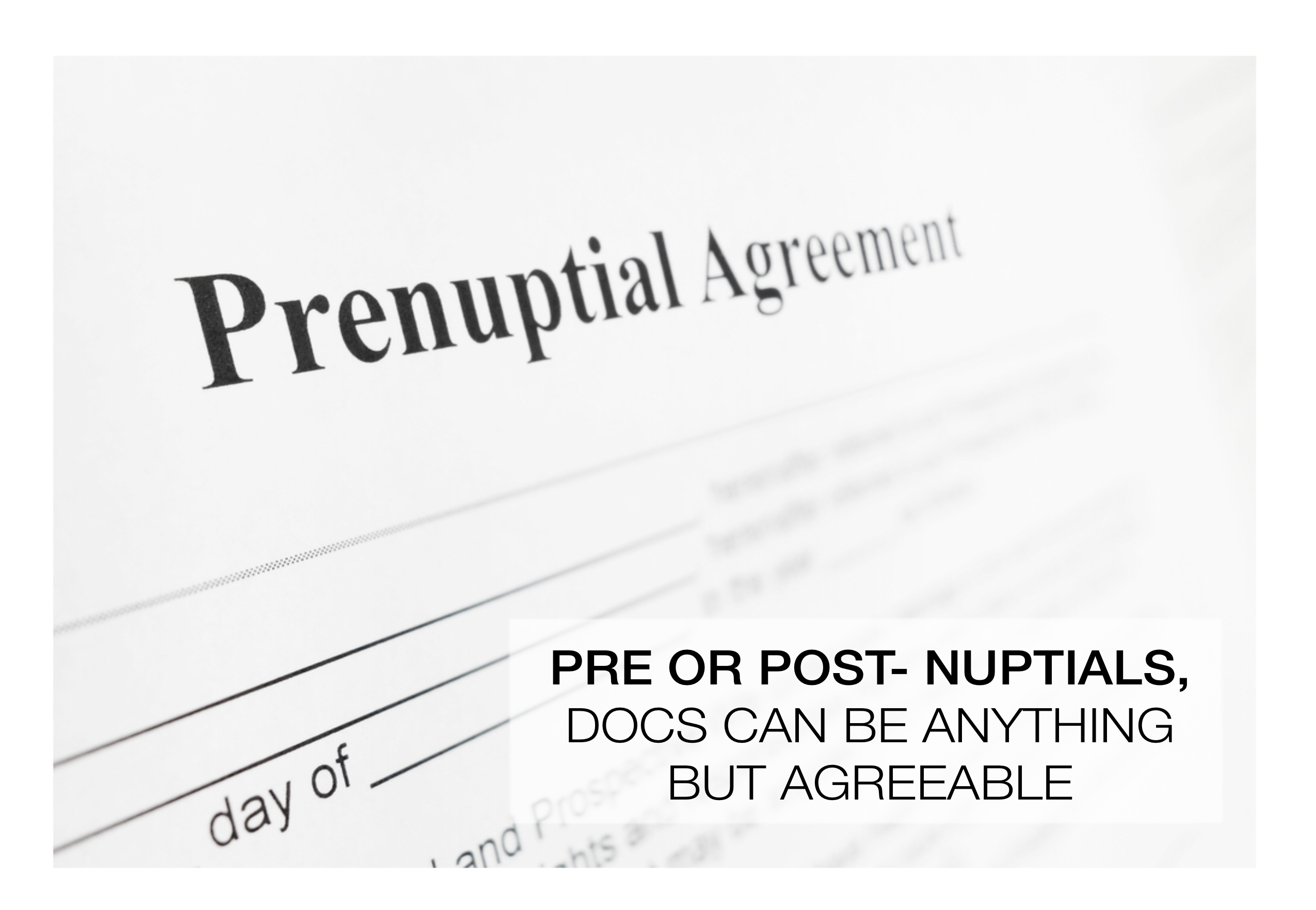Want to disrupt a relationship or marital bliss? Ask your fiancé or spouse – or that of your child planning their wedding – to present their loved one with a pre-nuptial or their spouse with post-nuptial agreement.
Whether called a prenuptial agreement, antenuptial agreement or premarital agreement, or a postnuptial agreement, if signed after the marriage or civil union, clearly lay out who gets what property or proceeds in the event of divorce or death.
They’re not inherently toxic to living happily ever after. In fact, they can play an important role in protecting assets and relationships. We previously wrote about expecting the unexpected, and the impact death, divorce and other calamities can have on life and family business.
Some patriarchs and matriarchs of high-net-worth families who have put in place family governance and planning look to protect their family assets by asking their children discuss a prenup with their fiancés. “Get this signed to protect the family,” the thinking goes.
The implication for some also reads, “get this signed, or be cut off.” For their part, the children often are petrified to present the documents, for fear of being perceived as injecting doubt about their commitment or inviting the ire of their parents if they refuse. Any discussion of trust or the relationship being about true love, becomes suspect.
The reality is that prenuptial agreements can be in the interest of both parties. If one fiancé or spouse has or brings significant means to the relationship, the agreement will protect those assets. It also can indicate an understanding of the dynamics at work, while also proving the other has no designs on the family assets. Regardless of what assets may be expected in case of divorce or death, they are codified in the agreement.
This isn’t just about rich versus not-so-rich. Pre- and post-nuptials also can protect couples of modest means, especially if one is a higher earner, or the other gives up a career to raise a family. Who gets what in the event of divorce can be spelled out in the agreement. Post-nuptials can be especially helpful if no will or trust is in place. Most importantly, it reduces the chance of conflict around their couple’s children in the case of divorce.
These don’t just protect young love gone awry. In January of this year, we wrote about the risks of grey divorce and in March, The American Bar Association also reviewed the subject in an article. Whilst in general the divorce rate has been dropping, the over 50’s account for a quarter of all divorces; the over 65’s represent 10%. Older Generation Xers and Baby Boomers may also have reason to reassess their interests, especially if they came into money later in life.
For families with international lifestyles, the legality of pre- and post-nuptial agreements vary country by country. I was married in Switzerland, under a prenup presented by my wife’s family. Switzerland recognises three marital regimes. Participation, community of assets and separation of assets, under some of these regimes, the State obliges a form of pre-nup written up and signed by a notary public.
Once you get beyond the perceived reputation, prenups clearly have distinct benefits. You never know where life will take you. With a prenup, regardless of wealth, the outcomes are outlined and the path clear. However, it must be stated that in some countries, inheritance is not part of assets considered in a divorce or nuptial agreement.
Matters of alimony, custody, child support and other payments are rarely that tidy and can ceaselessly clog our courts. But if the two parties treat it as a legal contract, it can ease dissolution of marriage and distribution of assets. At whatever age or stage the need arises, if one party honestly wants a pre- or post-nuptial agreement, it must be approached as an agreement amongst equals.
If this is a conversation you feel you must have, but still fear having it, a third party or mediator type person may help avoid or at least reduce any conflict or distrust. It is our opinion that the intermediary shouldn’t be hired by one party to seemingly “represent” both. They must be independent, or it can do irreparable harm to the negotiations or relationship. If both parties agree in principle to an agreement, that’s where a qualified attorney comes in, however each party should have their own counsel.
The winding road of marriage isn’t always smooth and doesn’t always end in bliss. Presented well, with mutual understanding and truly shared interests at heart, pre- or post-nuptial agreements can protect your futures and that of your children.

Leave A Comment